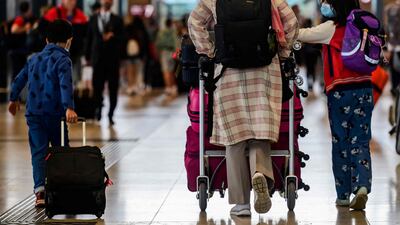Air travel continued to recover in May, with international travel growing more than fourfold, as a number of routes exceeded pre-Covid-19 levels, according to the International Air Travel Association (Iata).
Total air traffic in the month — measured in revenue passenger kilometres (RPKs) — rose more than 83 per cent compared with the same month last year, largely driven by a 326 per cent rise in international travel, bringing global traffic to almost 69 per cent of pre-Covid-19 levels, Iata said in its monthly market analysis released on Tuesday.
Domestic traffic, meanwhile, was up just 0.2 per cent from May 2021, with significant improvements in many markets cancelled out by a 73 per cent decline in China amid continued Covid-related restrictions.
Domestic air traffic levels were at more than three quarters of May 2019's levels, the industry body said, adding that year-to-date domestic traffic was up more than 16 per cent, while international traffic surged 276 per cent.
Aviation was among the industries hardest-hit by the pandemic, which had a domino effect on tourism, hospitality and supply chains. However, the sector is making a gradual recovery.
Many major international routes — particularly those within Europe, the Middle East and North America — are already surpassing pre-pandemic levels owing to the necessity of travel, said Iata's Director General Willie Walsh.
“The travel recovery continues to gather momentum. People need to travel. And when governments remove Covid-19 restrictions, they do. Completely removing all Covid-19 restrictions is the way forward,” he said.
Iata noted that it had returned to year-on-year comparisons, instead of comparing to 2019 (the year the pandemic started), except for in certain areas.
“Owing to the low traffic base in 2021, some markets will show very high year-on-year growth rates, even if the size of these markets is still significantly smaller than they were in 2019,” Iata said.
Air traffic in the Asia-Pacific and Europe both surged more than fivefold, with the former registering significant growth in the past four months and substantially above April's fourfold increase.
Recovery in the Asia-Pacific, where capacity more than doubled, was driven by the lifting of Covid-19 restrictions in most markets.
China, however, was the drag, because its “continuing zero-Covid policy is out-of-step with the rest of the world and it shows in the dramatically slower recovery of China-related travel”, Mr Walsh said.
Capacity in Europe was up more than threefold, with the impact of Russia's military offensive in Ukraine limited to only the areas directly affected by the conflict, Iata said.
Middle East airline traffic surged more than fourfold in May, with capacity more than doubling. The progressive reopening of Asian markets is boosting traffic through Gulf travel hubs such as Abu Dhabi and Dubai.
Carriers in North America and Latin America rose in the threefold range, with capacity in both more than doubling. African airline traffic more than doubled, with capacity up three quarters.
Despite the industry's continued improvement, Mr Walsh called for more co-operation between the industry and governments.
“In the longer term, governments must improve their understanding of how aviation operates and work more closely with airports and airlines,” he said.
“Having created so much uncertainty with knee-jerk Covid-19 policy flip-flops and avoiding most opportunities to work in unison based on global standards, their actions did little to enable a smooth ramping-up of activity.”
Mr Walsh also warned this week that the high price of oil will “without doubt” result in more expensive airline tickets, as the commodity is the single biggest element of an airline’s cost base.
Meanwhile, air cargo traffic in May declined 8.3 per cent, but was still an improvement after April's 9.1 per cent drop, Iata said.
This was attributed to the easing of restrictions related to the Omicron variant of Covid-19 in China. On a seasonally-adjusted basis, air freight posted 0.3 per cent growth after two months of decline.
“The return of Asian production as Covid-19 measures eased, particularly in China, will support demand for air cargo,” Mr Walsh said.






